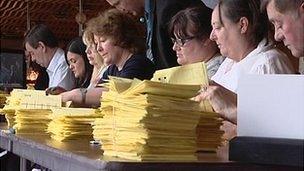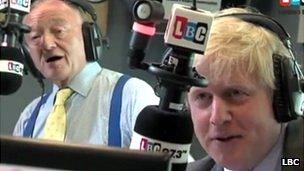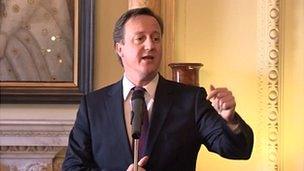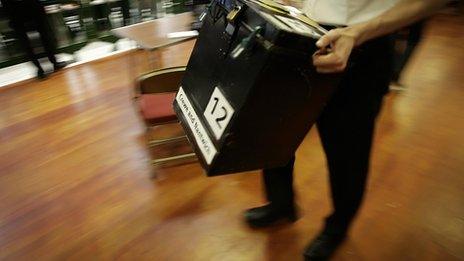The flawed concept that saw voters reject city mayors
- Published
- comments

Mayoral referendum votes are counted in Newcastle - one of nine cities that voted no
Voters have spoken. With the exception of Bristol, England's biggest cities did not want directly elected mayors.
Perhaps the scale of the no vote wasn't that surprising in the end.
This was a top-down campaign. It was the government that was keen on the idea of mayors. Voters in the cities needed to be persuaded - and the case clearly wasn't made to them.
Without any grass roots enthusiasm, the debate was often confined to the political elite, leaving voters unmoved. Support from business was thin on the ground.
And at a time when people take a dim view of politicians, asking them to vote for an extra one in the shape of mayor clearly didn't appeal.
Personality politics
I think the government also hoped city voters would look at London with envy and want their own mayoral contest.
But anecdotally many of the voters I spoke to in Newcastle were turned off by the personality politics of Boris v Ken.
They didn't fancy seeing their own versions of spats in lifts.

The personality politics of the London mayoral contest did not seem to appeal to voters in other cities
There was also an incoherence in the government's proposals that chimes with the other problems that have dogged the coalition in the last few weeks.
The government says it's keen on handing power to the people and, in truth, giving people a vote on whether to have a mayor fits in with that.
But at the same time the government is imposing directly-elected police commissioners on communities without any referendum.
If mayors are as good for communities as the government claims, why not just introduce them without a vote?
Then there is the problem of powers.
The government offered the referendums without specifying what might be on offer.
And while Nick Clegg told the cities that they could have extra powers whether they had a mayor or not, the PM seemed to suggest those that voted for mayors would get special treatment.
Limited powers
But in reality other government policies were actually removing powers.
The introduction of police commissioners meant the new city mayors would have less power over law and order than existing council leaders.

The Prime Minister tried to tempt voters by offering city mayors preferential treatment
The growth of free schools and academies would also see them have more limited power over education.
Then there was the government's argument that city mayors would have influence beyond local authority boundaries.
There was never any guarantee that could happen, just a vague desire.
If you really wanted that sort of politician, why not create mayors covering wider metropolitan areas - for Tyneside, Greater Manchester or West Yorkshire?
They might have been able to go toe-to-toe with their equivalent in London.
All this incoherence weakened the arguments of the yes campaign.
Other solutions
If the government is serious about handing powers to communities, it will now have to look for other solutions.
The government saw elected mayors as the key to the unresolved problem of English devolution.
In 2004, Labour saw elected regional assemblies as the solution.
Both have now been firmly rejected by the electorate.
But the problem of how to take power out of Whitehall remains.
The reality now is that the government will have to work with what's already there - the existing councils.
And there is a model for that. The councils in Greater Manchester have secured a city deal worth millions of pounds by signing a deal to co-operate together.
Others like Newcastle have been made to wait for similar extra powers and resources because the government wanted to see which way the mayoral referendums went.
City deals
It'll be up to the government now to prove it is still serious about handing powers to England's big cities.
But it will also be up to the cities to show leadership by co-operating with their neighbours to secure these city deals, and proving they'll use the resources and powers wisely.
There's little question our big cities are crucial to getting the economy growing again.
On that point the government was right, but now it must find other ways of unlocking that potential.
And as for David Cameron's proposed cabinet of city mayors, he may have to search for a smaller room than he originally booked.
- Published4 May 2012

- Published29 March 2012
- Published26 January 2012